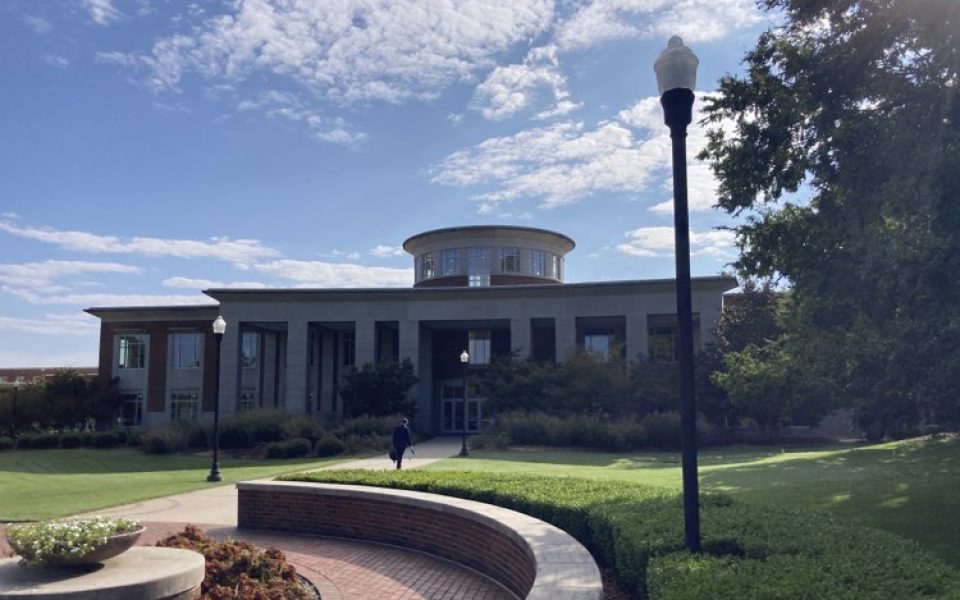A petition to suspend an academic program review has more than 3,600 signatures
More than 250 students and faculty members demonstrated on the campus of UNC-Greensboro Thursday afternoon, marching from the Jackson Library to the school’s Mossman Administration Building to oppose tuition and fee increases and potential cuts to programs.
The university, which has faced several years of enrollment struggles and budget cuts, is undergoing a program review that could mean further reductions — including the possible elimination of programs and departments on the campus. Administrators, including Chancellor Frank Gilliam, say the increases and program assessment are necessary to deal with pressures from inflation and changes to the UNC System’s campus funding model.
But with evidence from an independent review of the university’s finances and enrollment, students and faculty are arguing that’s not necessary.
“We are being gaslit, that is what’s happening — by Gilliam,” said Azariah Journey, a first-year graduate student in the museum studies program within UNCG’s history department, to cheers from protesters gathered around the steps of the campus’ Jackson Library.
“All of y’all deserve better,” Journey said to the assembled students and faculty, some of whom walked out of classes around 3:30 p.m. “Y’all are paying the money to be here. Y’all are paying the loans eventually. Y’all are getting the degrees. Why can’t they be transparent?”
On Friday a committee of students, faculty and staff will consider a proposal to increase tuition and mandatory fees for out-of-state students by 3%. That amounts to an extra $48 in student fees, plus an additional $302 in tuition for out-of-state undergraduates and $292 for out-of-state graduate students. The proposed increase is on top of an existing 3% increase on both in-state and out-of-state graduate tuition that was implemented for this academic year.
‘Cut their salaries, not our programs‘
At Thursday’s protest, demonstrators carried signs with messages like, “African American Studies Just Got Here,” “Students are not customers” and “Cut Their Salaries, Not Our Programs.”
One demonstrator lifted a sign displaying the salaries of top administrators at UNCG — including Gilliam’s — alongside the average graduate student stipend.

As Newsline reported last year, many graduate students receive tuition waivers but still have to pay student fees and living expenses. They conduct research and teaching work for universities across the UNC system for stipends that don’t cover their expenses. Those stipends have stayed flat for years while the cost of living has increased dramatically.
At UNCG, administrators say the only minimum observed for graduate student stipends receiving tuition waivers is $2,000 per year.
That’s led to some graduate students depending on food banks to eat, living in their cars and foregoing medical care they need but can’t afford.
By contrast, spending on salary and benefits in for “institutional support” — the main category for administration — rose 51% from 2017 to 2022. Over that same period, salaries and benefits for instructors rose 5.9%.
That and other details from an independent analysis commissioned by the campus chapter of the American Association of University Professors have led to heavy skepticism from students as administrators, trustees and the UNC Board of Governors consider tuition increases and budget cuts.

In a meeting with faculty earlier this week, Gilliam sought to rebut the analysis by Howard Bunsis, an accounting professor at Eastern Michigan University with extensive experience with these types of financials.
The report, which Bunsis delivered in a webinar earlier this month, reflects criticism common to reports he’s done at other universities, Gilliam said — including criticism of spending on administrative compensation and athletics.
At UNCG, a school not renowned for its sports teams in the manner of larger system campuses like UNC-Chapel Hill, N.C. State and neighboring N.C. A&T, the athletics program has run at a deficit of more than $10 million for more than decade. Last year, that deficit was more than $13.7 million.
In a meeting with administrators Wednesday, graduate students complained about an increase in mandatory student fees for programs like athletics, from which they say they don’t benefit.
A petition calling for suspension of the academic program review in light of statistics from the Bunsis report had more than 3,600 signatures as of Friday.
Next month the UNC Board of Governors, the system’s top governing board through which any cuts or increases to tuition and fees must ultimately pass, will hold its regular monthly meeting on UNCG’s campus.
Join the First Amendment Society, a membership that goes directly to funding TCB‘s newsroom.
We believe that reporting can save the world.
The TCB First Amendment Society recognizes the vital role of a free, unfettered press with a bundling of local experiences designed to build community, and unique engagements with our newsroom that will help you understand, and shape, local journalism’s critical role in uplifting the people in our cities.
All revenue goes directly into the newsroom as reporters’ salaries and freelance commissions.


Leave a Reply